This incredibly flavorful pickled deer heart recipe infuses the meat with a bright blend of vinegar and pickling spice. Organ meat is some of the most nutritious meat you can enjoy, and if you were blessed enough to harvest a deer this season, there is no better way to enjoy the fruits of your harvest than this simple pickled heart recipe.
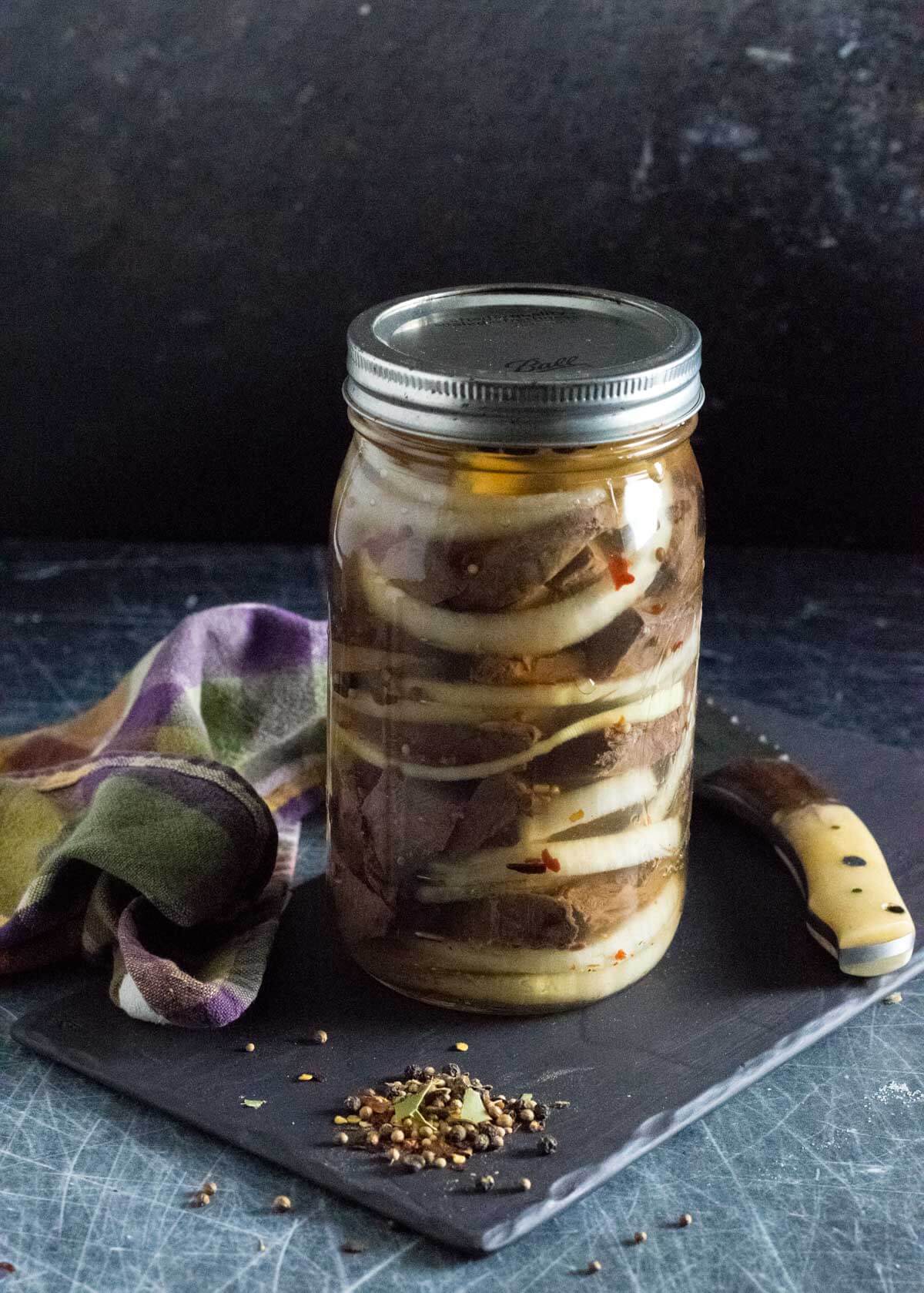
I understand, pickling venison heart is definitely a love-it-or-hate-it type thing. Growing up, my dad always pickled his deer hearts and I was always too repulsed to try it. However, my tastes have evolved since then and I now appreciate just how special of a treat this can be, so I created my own pickled deer heart recipe in honor of my dad's favorite treat.
Deer heart tastes slightly sweet, with a rather firm fine-grained texture. It isn't as strongly flavored as other organ meat, like the liver, which makes it perfect for soaking in all of the flavors of the pickling brine. This is a great recipe to introduce people to enjoying venison heart and could easily become your new hunting season tradition!
How to clean deer heart
For the best tasting deer heart, you are going to need to clean it properly. This is really easy to do. To begin, use a sharp knife to trim off any veins, vessels, connective tissue, or other stringy bits still attached to the outside of the heart from field dressing your deer.
The top of the heart will likely be coated with a hard fat cap, this won't taste very good. Cut off the entire top portion of the heart and remove it. You should now be left with a fairly clean-looking heart.
The final step is rinsing out the heart. Run it under cold water while squeezing the heart in pulses to expel the water. Initially, the water will come out red as it cleans out any leftover blood. Keep rinsing until the water runs clear, then drain heart of water.
Tip: I also recommend running your finger inside the valves to ensure there aren't any blood clots hiding inside. This would be discovered while boiling or slicing, but it is best to remove it in advance.
Ingredients Needed
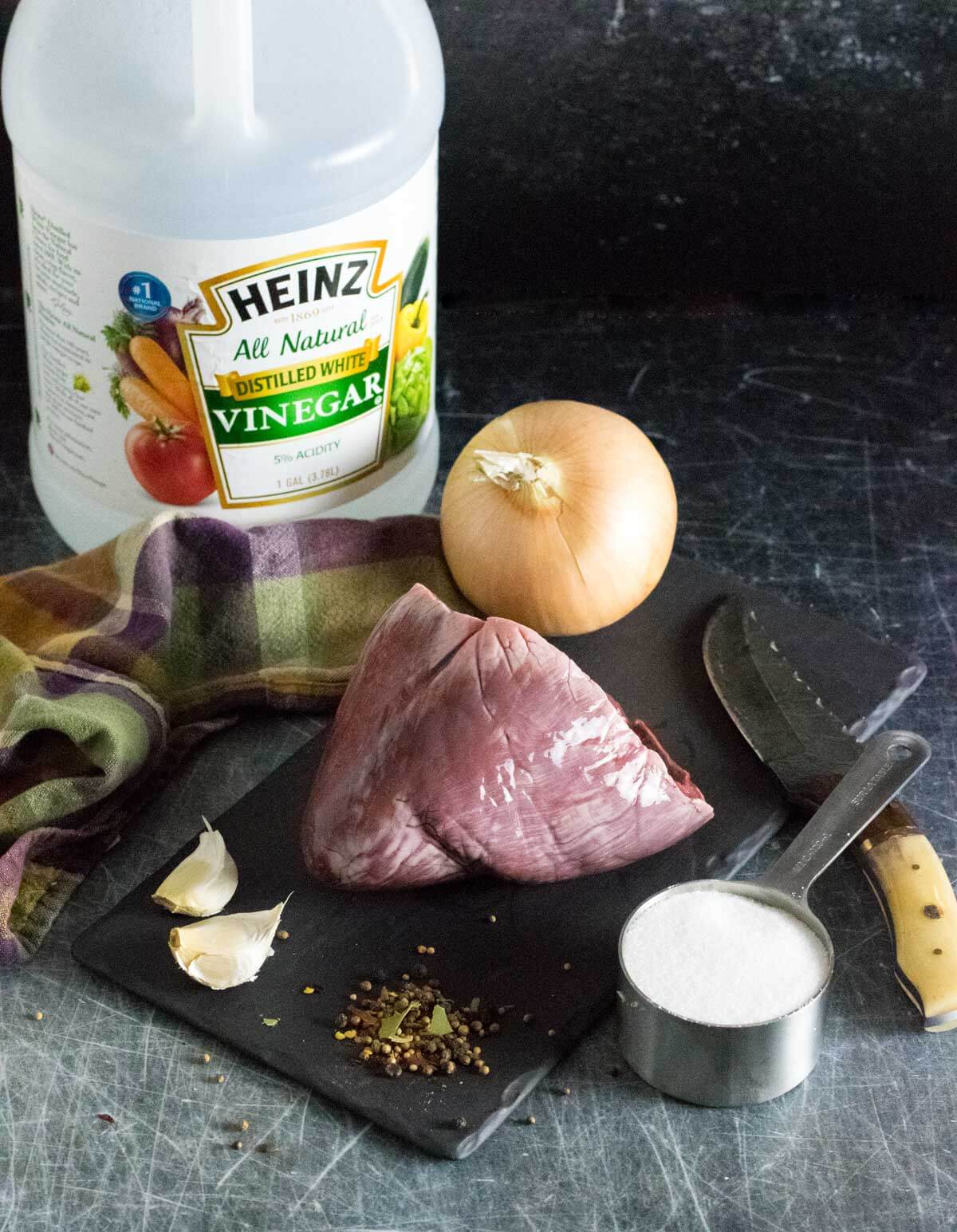
- Deer heart - This recipe will also work with other wild game, beef heart, or other cuts of deer meat such as deer tongue.
- Pickling spice - Pickling spice is optional, but I really like the flavor my pickling spice blend adds. Using storebought pickling spice is fine too.
- Yellow onions
- White vinegar - Apple cider vinegar can also be used to bring the flavor in a different direction.
- Water
- White sugar - Brown sugar can be used for a darker flavor.
- Garlic cloves
- Red pepper flakes - This can be left out if you don't want any heat.
- Kosher salt
- Quart jar
How to make it
Begin making this deer heart recipe by bringing a large pot of water to a rolling boil, ensuring you have enough water to cover the heart. Add one sliced onion along with one tablespoon of pickling spices and the deer heart. Boil heart for approximately 30 minutes, or until the heart is fully cooked.
While the heart cooks set a second medium saucepan on the stove top and add vinegar, water, sugar, salt, garlic, red pepper flakes, and the remaining one tablespoon of pickling spice. Bring the saucepan to a simmer and continue to simmer for 10 minutes, or until the sugar and salt are well dissolved. Then remove the pan from the heat and let cool slightly.
Once the heart is fully cooked place it on a cutting board and cut into bite-sized quarter inch slices. Any tough bits found inside the sliced heart valves can be trimmed off and discarded.
Fill your quart jar with alternating layers of raw onion slices and deer heart slices until the jar is full. Pour in brine to cover heart and onions, ensuring a garlic clove and plenty of pickling spice make it into the jar.
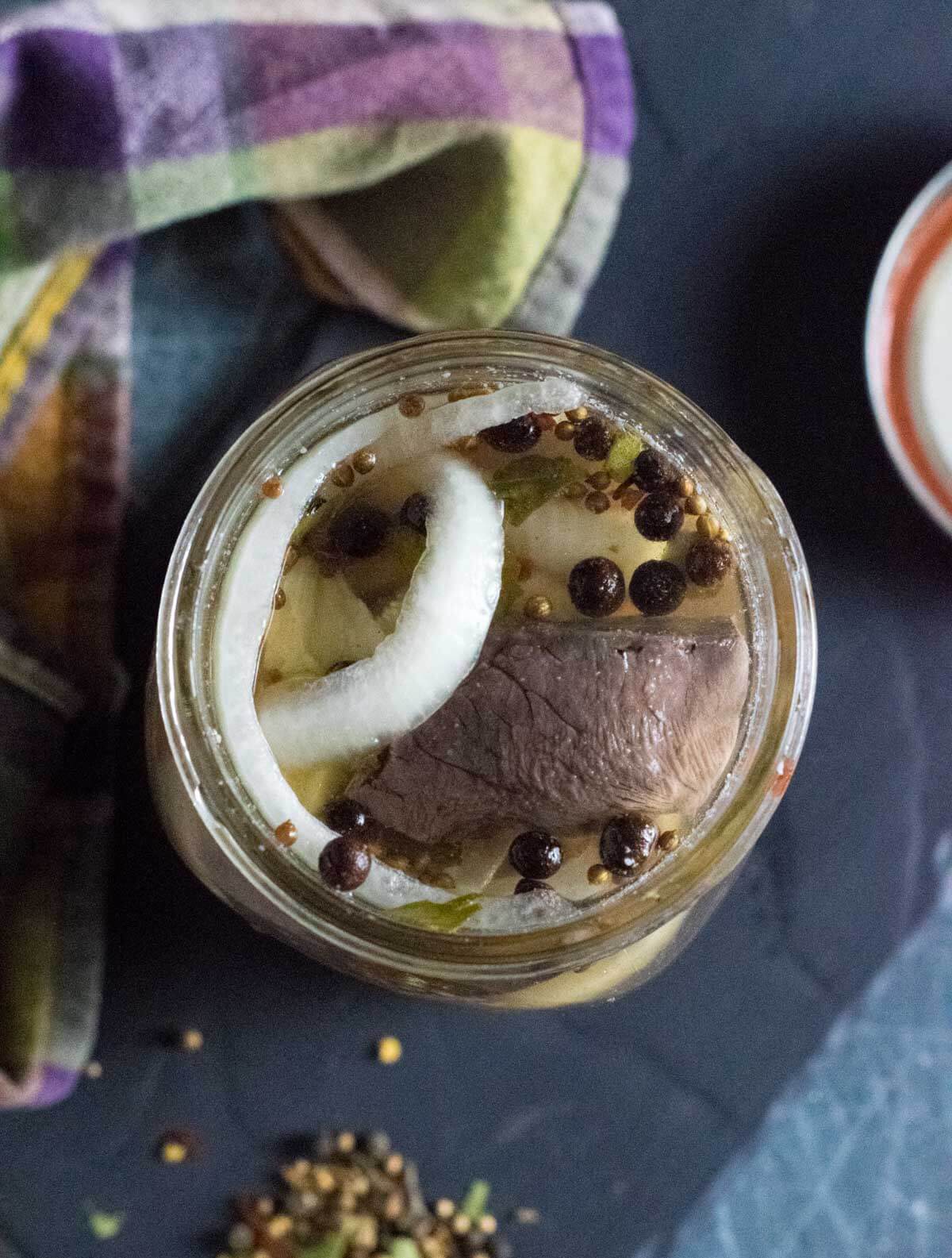
How to store it
Seal the mason jar tightly and store it in the refrigerator. The flavor will continue to improve as the organ meat soaks in the brine. I recommend giving it at least 48 hours to pickle before enjoying, but longer is even better. As long as the meat stays in the vinegar solution you can expect it to have a fairly long shelf life in your fridge.
More Pickling Recipes
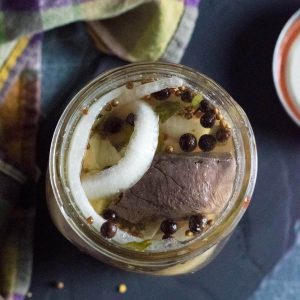
Pickled Deer Heart
Ingredients
- 1 deer heart
- 2 tablespoons pickling spice divided
- 2 yellow onions sliced
- 3 cups white vinegar
- 1 cup water
- ½ cup sugar
- 2 cloves garlic peeled
- ½ teaspoon red pepper flakes
- 1 teaspoon kosher salt
- 1 quart jar
Instructions
- Clean the deer heart by trimming off the hard fat on top of the heart, along with any other pieces that may be attached to the heart yet. Rinse well under cold water while squeezing the heart to expel any blood left inside. Repeat until the water runs clear.
- Bring a large pot of water to a boil over high heat and add one sliced onion, one tablespoon of pickling spice, and the deer heart. Boil for 30 minutes, or until the heart is cooked through.
- While the heart is boiling prepare a medium saucepan by adding the vinegar, water, sugar, whole garlic cloves, crushed red pepper flakes, salt, and remaining tablespoon of pickling spice.
- Set over medium-high heat on the stovetop and bring to a simmer. Reduce the heat and continue to simmer for approximately ten minutes, or until sugar and salt are well dissolved. Then remove from heat and let cool.
- When the heart is done boiling set it on a cutting board to cool enough to handle, then cut into bite-size ¼" slices.
- Add remaining sliced raw onion and the boiled heart to a mason jar in alternating layers until full. Then pour in enough brine to fill completely, ensuring pickling spice and garlic clove get added as well.
- Place a lid on the jar and set in the refrigerator to pickle for at least 48 hours, although the flavor will continue to improve over the next few days.


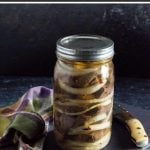
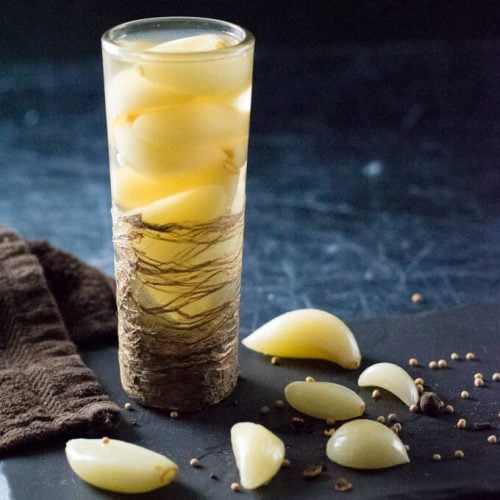
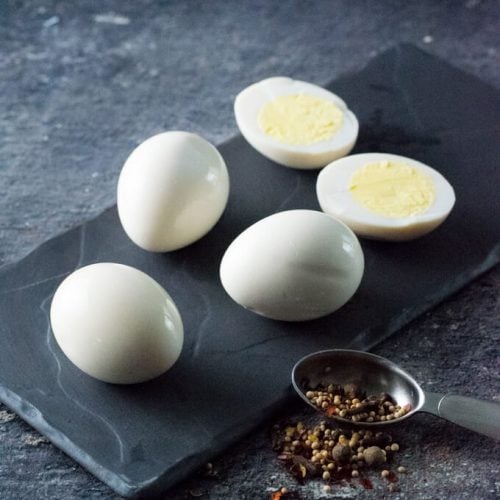
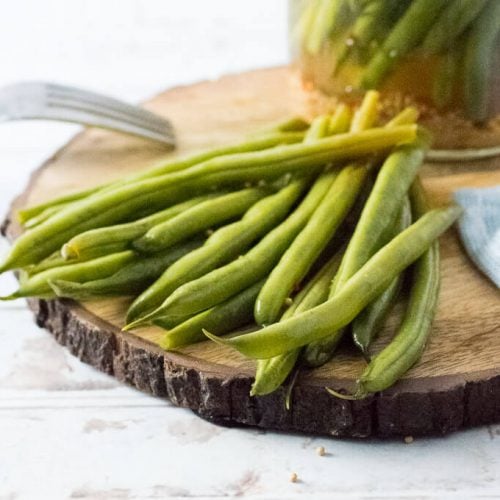
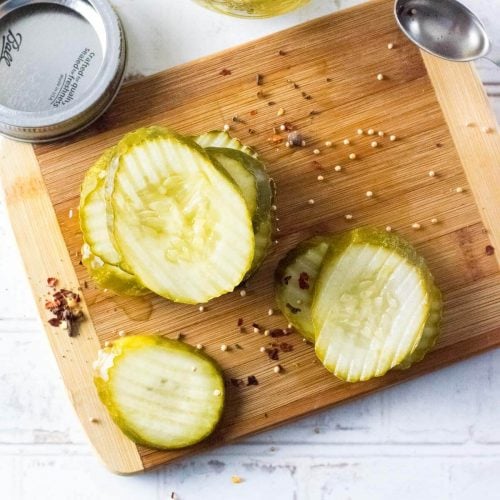
Zach
This is a great recipe. The heart chunks are nice to eat on a cracker with an onion slice. Good one to bring to deer camp. Works with any animal hearts (chicken, lamb, pig, etc). Thanks for sharing!
Kimbarly
I tried a similar pickled deer heart recipe and loved the unique flavor! The brining and pickling process makes the heart tender with a tangy kick. Definitely a must-try for wild game enthusiasts!
Robert Kinderman
I've made this recipe of yours in the past. It is reminiscent of my dads recipe. Very good.
lynn allen
Excellent taste. Thank you.
Rob
Excellent. My son and i loved it so much we pickled two more venison hearts. Thank you